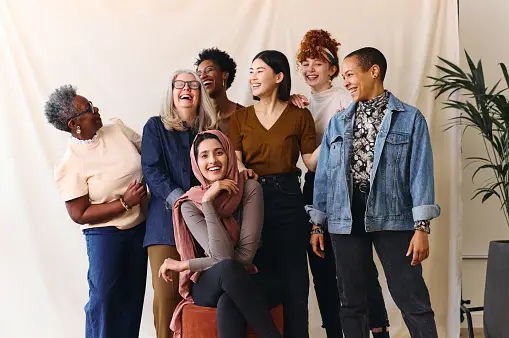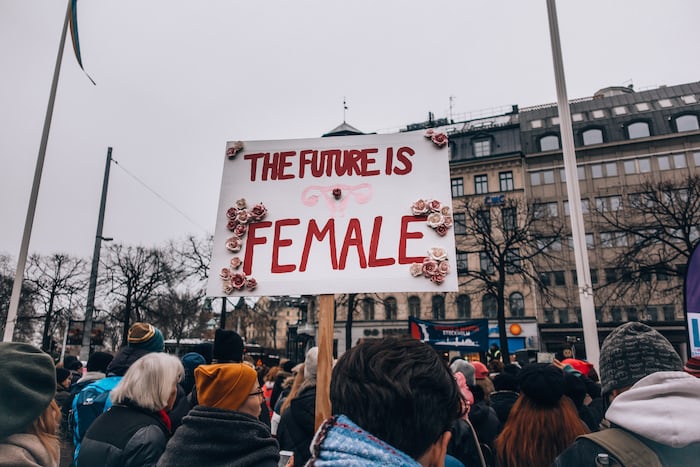In today’s rapidly changing world, the significance of women empowerment and gender equality cannot be overstated. Women make up roughly half of the world’s population, and their equal participation and empowerment are vital for achieving a just, inclusive, and sustainable society. By addressing the historic imbalances and barriers faced by women, we can unlock their full potential and contribute to the progress of humanity as a whole.
Gender equality is not just women issue- it is a fundamental human right. It encompasses the idea that all individuals, regardless of their gender, should have equal opportunities, rights, and access to resources. By dismantling the structures of discrimination and bias, we can create a society where everyone can thrive and contribute their unique talents and perspectives.
 Defining Women Empowerment and Its Broader Implications.
Defining Women Empowerment and Its Broader Implications.
Women empowerment refers to the process of equipping women with the tools, resources, and opportunities they need to realize their full potential and participate equally in society. It goes beyond merely giving women power; it aims to challenge and transform the existing power structures and social norms that perpetuate gender inequality. Empowering women involves recognizing their inherent rights, agency, and autonomy. It means enabling them to make decisions and choices that affect their lives, whether it’s related to education, career, health, or personal matters. Women empowerment is about ensuring that women have control over their own lives and can actively contribute to the betterment of their communities and society as a whole.
To achieve women empowerment, it is essential to break down the societal barriers and discriminatory practices that hinder women’s progress. These barriers can manifest in various forms, such as unequal access to education, limited economic opportunities, gender-based violence, cultural norms, and discriminatory laws.
Efforts to empower women are challenging and changing these deeply ingrained biases and structures requires advocating for legal reforms, promoting gender-sensitive policies, and fostering a culture of inclusivity and gender equality. By dismantling these barriers, we can create an environment where women can thrive and fulfill their aspirations.
 The Role of Education in Empowering Women.
The Role of Education in Empowering Women.
Education plays a crucial role in empowering women. Access to quality education equips women with knowledge, skills, and confidence, enabling them to participate fully in social, economic, and political spheres. Education provides women with opportunities for personal growth, enhances their decision-making abilities, and opens doors to better employment prospects.
Furthermore, education helps challenge traditional gender roles and stereotypes by promoting critical thinking, gender equality awareness, and empowerment. When women are educated, they are more likely to challenge oppressive norms, advocate for their rights, and contribute to positive social change within their communities.
The Impact of Economic Empowerment on Women’s Progress.
Economic empowerment is a vital aspect of women’s empowerment. When women have access to economic resources, they gain independence, financial stability, and increased decision-making power. Economic empowerment can be achieved through various means, such as equal employment opportunities, entrepreneurship, access to credit and financial services, and fair wages.
When women are economically empowered, it positively impacts their overall well-being and that of their families. They can invest in their children’s education, healthcare, and nutrition, leading to intergenerational benefits. Additionally, women’s economic empowerment contributes to poverty reduction, economic growth, and the advancement of societies as a whole.
By understanding and actively working towards women empowerment, we can create a more equitable and inclusive world. It requires collective efforts, policy changes, and a shift in societal attitudes. When women are empowered, the benefits extend beyond individuals to communities and societies, fostering progress and creating a brighter future for all.
Gender equality is not only a matter of social justice; it is a fundamental human right that every individual should enjoy. It entails treating all genders with equal respect, dignity, and value, regardless of their biological or perceived differences. Recognizing gender equality as a human right means acknowledging that everyone should have equal opportunities, freedoms, and protections, regardless of their gender identity or expression.
 Addressing Discrimination, Violence, and Harmful Practices Against Women and Girls.
Addressing Discrimination, Violence, and Harmful Practices Against Women and Girls.
To uphold gender equality as a human right, it is crucial to address discrimination, violence, and harmful practices that disproportionately affect women and girls. This includes combating gender-based discrimination in all its forms, such as unequal treatment in employment, education, and access to resources. It also involves eradicating violence against women and girls, including domestic violence, sexual assault, and harmful traditional practices like child marriage and female genital mutilation.
Efforts to promote gender equality as a human right require the development and implementation of laws, policies, and programs that protect women’s rights, ensure their safety, and hold perpetrators accountable. It involves raising awareness about the negative impact of gender-based violence and working towards creating a society where all individuals can live free from fear and discrimination.
Gender equality as a human right also entails advocating for equal access to education, healthcare, and decision-making positions. Every individual, regardless of their gender, should have equal opportunities to pursue education and acquire knowledge. This includes addressing barriers that hinder girls’ access to education, such as cultural norms, poverty, and discriminatory practices.
Similarly, gender equality encompasses ensuring equal access to healthcare services, including reproductive health, for all individuals. It involves challenging gender stereotypes and biases that limit women’s access to quality healthcare and reproductive rights.
Furthermore, gender equality as a human right necessitates advocating for women’s equal representation and participation in decision-making positions. Women should have an equal voice and influence in shaping policies, laws, and institutions that affect their lives and the wider society. This involves breaking down barriers and biases that prevent women from entering leadership roles and creating inclusive environments that value diverse perspectives.
By recognizing and promoting gender equality as a fundamental human right, we can strive towards a just and inclusive society. It requires collective efforts, education, and a commitment to challenging and transforming discriminatory practices. When gender equality is upheld, individuals can fully exercise their rights, contribute to society, and thrive in a world that celebrates diversity and inclusion.
Closing gender gaps require removing barriers and promoting equal opportunities for women. This involves challenging societal norms, stereotypes, and biases that perpetuate gender inequalities. It means creating inclusive environments where women have equal access to education, job opportunities, and resources necessary for their personal and professional development.
To address gender gaps in education, efforts can be made to promote girls’ enrollment and retention, provide scholarships, and encourage their participation in fields traditionally dominated by men, such as science, technology, engineering, and mathematics (STEM). In the workplace, organizations can implement policies that promote gender equality, such as pay equity, flexible work arrangements, and support for career advancement. Political systems can work towards increasing women’s representation through affirmative action measures, gender quotas, and promoting women’s political participation.
Breaking stereotypes and challenging societal norms is crucial for achieving true gender equality. Gender stereotypes often limit opportunities and reinforce unequal power dynamics. By challenging these stereotypes and promoting diverse representations, we can create a society where individuals are not confined by traditional gender roles.
Promoting gender equality requires empowering both women and men to challenge harmful norms and expectations. It involves encouraging men to actively support gender equality, challenge toxic masculinity, and promote positive models of masculinity. By fostering dialogue and creating inclusive spaces, we can break down barriers and reshape societal norms to embrace diversity and equal opportunities for all.
By addressing gender gaps, removing barriers, and challenging societal norms, we can strive towards a more equal and inclusive society. It is a collective responsibility that requires the involvement of individuals, communities, organizations, and governments. Closing gender gaps is not only a matter of fairness but also essential for social progress and sustainable development. When everyone has an equal chance to thrive, we can unlock the full potential of individuals, foster innovation, and create a better future for all.
 Encouraging women’s participation in decision-making processes is crucial for achieving gender equality. It is essential to create inclusive spaces that empower women to engage in politics, governance, and other spheres of influence. This can be achieved by implementing policies and initiatives that promote gender-balanced representation and ensure equal opportunities for women to participate and lead.
Encouraging women’s participation in decision-making processes is crucial for achieving gender equality. It is essential to create inclusive spaces that empower women to engage in politics, governance, and other spheres of influence. This can be achieved by implementing policies and initiatives that promote gender-balanced representation and ensure equal opportunities for women to participate and lead.
Efforts should be made to overcome barriers that hinder women’s participation, such as discriminatory practices, social norms, and lack of access to resources and networks. Providing mentorship, training, and support programs can help women build the necessary skills, confidence, and networks to actively participate in decision-making roles. By actively involving women in shaping policies, laws, and strategies, we can create a more inclusive and representative society.
Achieving gender equality requires engaging men and boys as allies in the pursuit of change. Men have a significant role to play in challenging patriarchal systems, norms, and behaviors that perpetuate gender inequalities. By promoting positive masculinity, advocating for women’s rights, and actively supporting gender equality initiatives, men can contribute to dismantling gender stereotypes and fostering a more equitable society.
Engaging men and boys in conversations about gender equality is crucial to raise awareness, promote understanding, and inspire collective action. It involves challenging harmful attitudes and behaviors, fostering respectful relationships, and promoting gender equality in personal, professional, and societal contexts. By working together, women and men can create a more inclusive and just world, where gender equality is not only a women’s issue but a shared responsibility.

The Role of Women in Fostering Economic Growth and Stability.
Women play a crucial role in fostering economic growth and stability. When women have equal access to economic opportunities, they can contribute to entrepreneurship, innovation, and productivity. By closing gender gaps in the labor market, promoting women’s entrepreneurship, and ensuring fair and equal pay, we can unlock the economic potential of half the population.
Investing in women’s economic empowerment yields significant benefits, not only for women themselves but also for families, communities, and economies as a whole. It leads to poverty reduction, improved household welfare, and increased economic resilience. Moreover, when women control financial resources, they tend to invest in education, healthcare, and the well-being of their families, creating a positive ripple effect for future generations.
Creating a gender-equal world is a collective responsibility that requires the commitment and collaboration of individuals, communities, organizations, and governments. It goes beyond the efforts of one group or sector. Everyone has a role to play in challenging gender norms, dismantling discriminatory systems, and promoting equal opportunities for all.
By recognizing that gender equality benefits society as a whole, we can mobilize collective action towards achieving this goal. It involves promoting respectful and equal relationships, advocating for policies and laws that protect women’s rights, and actively working towards dismantling gender-based discrimination in all its forms.
 Steps Individuals, Communities, and Organizations Can Take to Promote Gender Equality.
Steps Individuals, Communities, and Organizations Can Take to Promote Gender Equality.
Promoting gender equality starts with individual actions that collectively contribute to societal change. Individuals can examine their own biases, challenge stereotypes, and treat everyone with fairness and respect. By promoting equal opportunities and supporting women’s empowerment in personal and professional settings, individuals can create positive ripple effects within their communities.
Communities can foster inclusive environments that celebrate diversity, challenge discriminatory practices, and provide equal opportunities for all community members. They can organize awareness campaigns, workshops, and events that promote gender equality, challenge harmful traditions, and support women’s leadership and participation.
Organizations can implement gender-responsive policies and practices that promote equal opportunities, pay equity, and work-life balance. They can prioritize diversity and inclusion in hiring practices, leadership positions, and decision-making processes. Investing in women’s leadership development and providing mentorship and support programs can further empower women within organizations.
Inspiring future generations and fostering a culture of inclusivity and equal opportunities is crucial for long-term change. By challenging gender stereotypes from an early age, we can instill values of respect, equality, and empathy in children and young people. Education plays a vital role in promoting gender equality by teaching about the importance of equal rights, challenging harmful norms, and promoting diverse role models.
Creating safe spaces for dialogue, mentorship, and support can empower young girls and boys to challenge gender inequality and become agents of change. By providing access to resources, scholarships, and opportunities for skill-building, we can ensure that all young people have the tools they need to thrive and contribute to a gender-equal future.
Women empowerment and gender equality are fundamental to creating a fair, inclusive, and prosperous society. They are not only moral imperatives but also prerequisites for social progress, sustainable development, and peace. By empowering women and achieving gender equality, we can address systemic inequalities, promote economic growth, and foster social cohesion.
Each individual has a responsibility to contribute to the cause of women empowerment and gender equality. It starts with examining our own beliefs, biases, and behaviors and actively working towards promoting equality in our daily lives. By supporting women’s voices, amplifying their achievements, and advocating for equal opportunities, we can create a collective movement for change.
Let us envision a future where women can unleash their full potential, free from discrimination and societal barriers. A future where women’s leadership is valued, their rights are protected, and their contributions are recognized and celebrated. By working together, we can create a gender-equal world, where every individual has an equal opportunity to thrive, and our collective potential is realized.


I am impressed with this web site, real I am a fan.